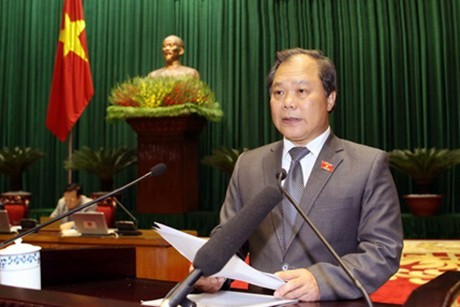
Phan Trung Ly, Head of the Legal Committee of the National Assembly and a member of the Constitutional Revision Drafting Committee |
(VOVworld) - National Assembly deputies spent all day on Tuesday discussing constitutional amendments. The deputies praised the Constitutional Drafting Committee’s efforts in the collection and analysis of public opinions regarding constitutional revisions. Huynh Ngoc Dang, a deputy from Binh Duong province stressed the importance of stipulating that State power is unified, delegated, coordinated and controlled by state apparatuses in exercising its legislative, executive and judiciary rights. He said: “I agree to keep the word “control” in the stipulation of state power. However, this issue is not clearly stipulated in other chapters. I propose to add more specific regulations on control by state apparatuses in the chapters on the State President, the Government and the Court”.
Land-related regulations were also high on the agenda of today’s meeting. Bui Manh Hung, a deputy from Binh Phuoc province, said that land is a special natural resource and so land management should be based on the law rather than planning: “I recommend eliminating the planning stipulations regarding land management in the draft revision. Land planning and utilization should be regulated by law. Land use right is an asset right, so the Constitution needs to affirm that land use right is an asset right to serve land planning, clearance, and acquisition. Land users are obliged to use their land effectively. The Constitution needs to state clearly that the National Assembly and the Provincial People’s Councils are the people’s representatives in deciding the necessity of land acquisition”.
The deputies also discussed the organization of local administrations, regulations on votes of confidence, and the role of social and political organizations. Representing Binh Dinh province, deputy Le Dac Lam said: “There has not been any review of the pilot program of not organizing people’s councils at district and ward levels. This program was aimed at redefining the authority of the local administration in rural, urban and island areas. The concept of local administration should be stipulated in the constitution.”
Some deputies agreed with the contents about religion and ethnicity in the draft constitutional revision. Nguyen Danh Ut, a deputy for Kien Giang province said: “The issue of ethnicity is touched upon in many chapters of the draft revision. It’s important to say that the Socialist Republic of Vietnam is a unified country of all Vietnamese ethnic groups in order to define the uniform ethnicity of all groups. This regulation will encompass Vietnamese nationals abroad and conform to the law on Nationality.”
The National Assembly will vote to approve the draft 1992 constitutional revision on November 28th.
Voters have agreed on the need to exercise and protect the constitution. Mac Nhu Mai of Quang Nam province agreed with the draft 1992 constitutional revision in terms of state power, human and citizen rights, the party’s leadership, and constitutional protection mechanisms. He said: “The opinions of the deputies are appropriate to the current situation. The constitution should quickly be put into action to better serve the nation and the people.”
Cao Ngoc Tam, President of Nha Trang city’s Fatherland Front, said that the National Assembly should pay more attention to the role of fatherland fronts in the constitution: “I hope that the deputies will further discuss the role of fatherland fronts in the current situation. This will help the fatherland front to fulfill its role as the political foundation of the people’s administrations. This will contribute to the building of a democratic, equal and civilized society.”
Cao Van Hoai of Hanoi said that the constitutional revision should clarify human and citizen rights as well as think about representative democracy. He hoped that there would be more democracy and transparency in any referenda and direct dialogue between state agencies and the people in order to create social consensus.